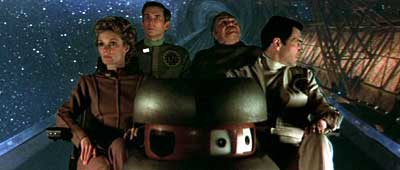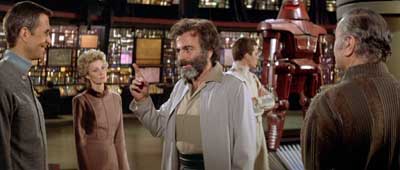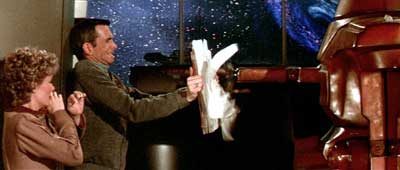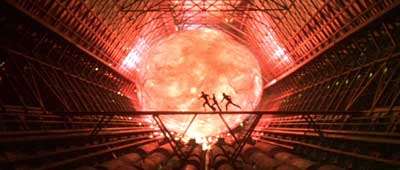The Black Hole
Cult sci-fi camp that fails to fill the void of modern viewing expectations. A memory sullied.

Never one to jump on a bandwagon coughcough, the Disney suits simply decided 1979 was a great year to make a big budget sci-fi film set in space; a decision I'm sure they would have made regardless of the emergence of the Star Wars phenomenon. Wheeling out the biggest budget they could muster and recording for the first time in Dolby stereophonic sound on a (then) massive 70mm print, the mousedom execs must have been rubbing their hands in glee at the projected returns figures. Pity then that it was panned from every angle by a press who had seen bigger and better two years previous.
Opening promisingly with a suitably ominous John Barry theme and a cool vector graphic display, the movie quickly introduces us to the crew of the exploration ship Palomino, it's mission to seek new lifeforms in the vast uncharted regions of space (think the starship Enterprise only smaller and shaped more like a candle holder). Headed by Captain Dan Holland (Robert Forster), the rest of the crew comprises scientists Dr. Alex Durant (Anthony Perkins) and Dr. Kate McCrae (Yvette Mimieux), Lieutenant Charles Pizer (Joseph Bottoms) and engineer Harry Booth (the ever magnificent Ernest Borgnine, yay!). Also along for the ride is the painfully named V.I.N.CENT (Vital Information Necessary CENTralized, if you ever heard such a strained acronym), a floating robot helper (nay hinderer) voiced by Roddy MacDowall, whose primary purpose seems to be to regurgitate Cicero's worthless philosophical anecdotes at the most frustratingly inappropriate times.
Affected by a shift in gravitational forces, the crew of the Palomino investigate the source and discover the largest black hole ever seen (presumably they're a common sight in this particular time). More surprising is the discovery of a long-lost research vessel called the Cygnus, floating dormant in space yet strangely unaffected by the immense pull of the vortex. After a brief flyby almost sends them tumbling into the anomaly, the crew take the opportunity to dock with the Cygnus in order to hopefully make repairs. Once on board they discover that the seemingly deserted ship is in fact still inhabited by Dr. Hans Reinhardt (Maximilian Schell) and an assortment of faceless robots he has created for company over the last twenty-odd years, including his personal protector; a floating red menace of a tin can called Maximillian whose murderous tendencies make him something of an electrical Ed Gaines.

After Reinhardt explains the remainder of the crew left in an escape vessel twenty years ago but were never heard from again, Holland offers him a ride home and is somewhat perplexed when he declines. Reinhardt has apparently been using his spare time constructively and has created an anti-gravity device that prevents the Cygnus from being drawn into the black hole. He explains he intends to use the same device to protect the Cygnus from the massive forces and travel through the hole, fulfilling his desire to be the first to discover a brand new universe on the other side. Understandably skeptical of the man's sanity, Holland and company decide to make their repairs and be on their way, but a determined Reinhardt decides he cannot allow them to leave and potentially jeopardise his work.
Summoning an army of his finest mute dustbin warriors, Reinhardt plays Evil Scientist, unleashing all manner of bad special effects upon our hapless protagonists. Patented Slow Laser Beams™ aplenty follow, as do the traditions of wrapping people's heads in tinfoil and having holes in the ship threaten to suck everyone into space. It's all very average stuff, but at the time the effects and action were suitably immense, and to be fair there are one or two examples of both that still have a quaint kind of magic about them. The score seems at times woefully misplaced, but I attribute this to director Gary Nelson's decision as to where and when to use it rather than Barry's composition. By the time the kerfuffle settles everything's gone pear-shaped and the whole lot of them end up disappearing down the black hole, at which point some bizarrely existential imagery takes precedence and gives way to Reinhardt trapped in Maximillian's shell apparently burning in hell. Deep. Either that or some half-assed 2001 rip-off.
Nelson's wayward direction aside, the biggest problem faced by The Black Hole is a downright awful script. Hindering the movie at every step, an ensemble of studio writers' excuse for dialogue and plot threatens to swallow the movie just as the Cygnus is doomed to disappear into the gaping maw of oblivion. Setting up several potentially intriguing threads (McCrae's father having been one of Reinhardt's crew, Durant's gradual shift to his captor's way of thinking, the fact Reinhardt's robots are actually the animated cadavers of his crew), the film sees any possible intrigue being cack-handedly dashed on the rocks of budgetary excess as the battle of wills gives way to ever more extravagant (and now horrifically dated) fx setpieces. Why waste time exploring Reinhardt's obsession or his bizarrely auto-erotic relationship with Maximillian when you can have badly matted meteors smashing everything up?

Huge black holes open up in the logic too. Witness V.I.N.CENT completely forgetting to mention that Durant has been killed and MacCrae kidnapped until Reinhardt claims they have merely chosen to stay aboard the Cygnus whilst the others escape, messily necessitating the crew of the Palomino returning to the Cygnus for a climactic rescue attempt. Tsk. I'm sure better motivation could have been found rather than resorting to a robot having a bout of amnesia. Similarly Kate is introduced as having ESP abilities which she can needlessly use to communicate with robots. Riiiiiiight. Pointless? Oh yes. The origins of this ability explained? Not a chance. She just has it, alright?
In fairness, there are a number of things for which the movie deserves praise. As I mentioned earlier, one or two of the effects still retain a little integrity, although the majority now unfortunately look like the work of a five-year-old waving his mouse around in Photoshop. As bad as the script may be there's also one or two noteworthy moments of dialogue, such as Pizer's frustration at V.I.N.CENT's ramblings resulting in the pained observation that "When I took this job, I never imagined I would end up playing straight man to a tin can!". Schell is decent and camp enough as Reinhardt, even if his support from the likes of Forster and Mimieux is a little wooden. Borgnine's presence is largely unnecessary, which is something of a shame as normally he's hugely reliable in terms of levity and humorous intervention, and as for Perkins' appearance...well, let's just say second billing is in no way indicative of his contribution to the thespian aspect of the picture.
The single biggest redeeming factor I can find is the often stunning set design, somewhat wasted on what is otherwise a shambling production of questionable values. Shame it all gets the shit smashed out of it in the last twenty minutes. Perhaps if a fraction of the design budget had been allocated to buying nuts and a typewriter for a trained monkey the script could have been saved...

A lot has changed in the fifteen years since I last saw this movie, most pertinently here the benchmark by which I judge my sci-fi adventures. As magical as I remember the film being way back in the day, The Black Hole is one of those films my generation would do better to fondly remember rather than revisit. Unlike say Tron, which has arguably weathered far more gracefully, The Black Hole was flawed from the beginning, meaning all the imperfections that back then eager young minds cared not a jot about now manifest themselves as irreparable rents in the very fabric of the movie. Not even the endearing camp value it shares with so many old sci-fi flicks of it's ilk can save it from disappearing down the plughole of it's own inadequacy.
Considered by some a cult classic, The Black Hole is unfortunately something of a space-based white elephant; an early example of style over substance from an era and genre where style never actually existed. Still, ninety minutes nip by promptly enough and it's still certainly no worse than such modern fare as Tomb Raider 2. All the same, this is one ambitious, pioneering sci-fi flick that's best left on the shelf of this young man's memory.
From my black hole of nostalgia I award this movie 2 out of 5 Disko Gravitational Field Units.
Robert Forster (Capt. Dan Holland)
Anthony Perkins (Dr. Alex Durant)
Yvette Mimieux (Dr. Kate MacCrae)
Ernest Borgnine (Harry Booth)